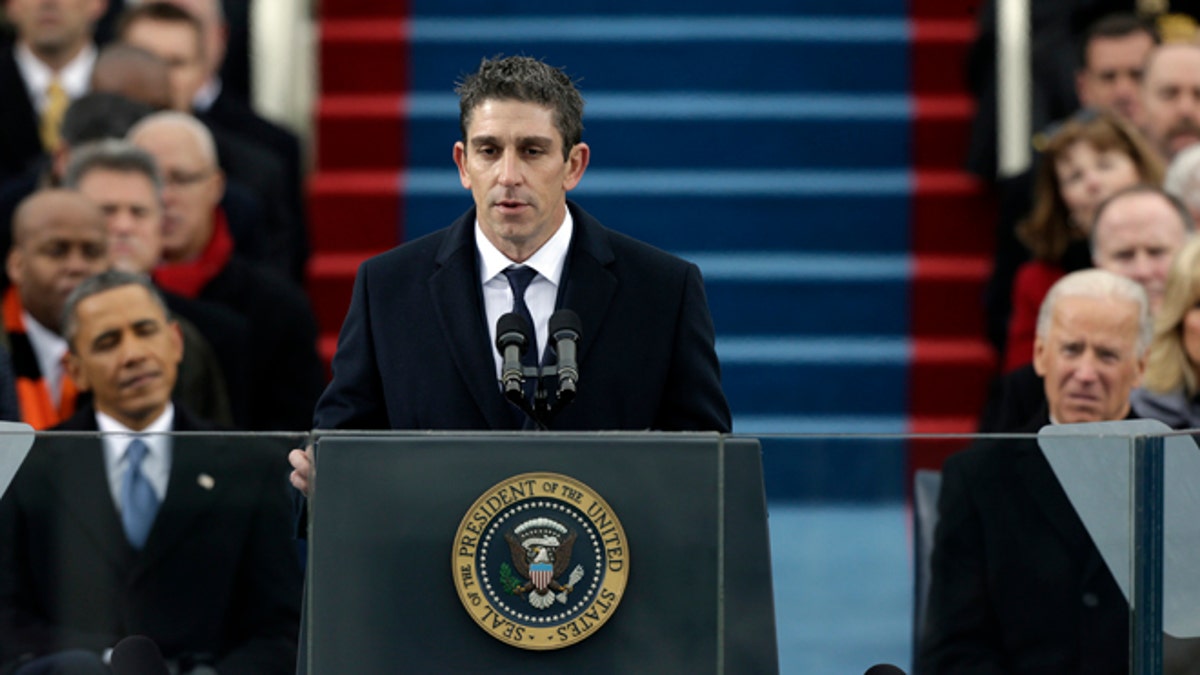
FILE - In this Jan. 21, 2013 file photo, poet Richard Blanco speaks at the U.S. Capitol in Washington during the inauguration for President Barack Obama, left, and Vice President Joe Biden right. Blanco - the nations inaugural poet and the son of Cuban exiles - is launching a writing project to bridge what he calls Cubas emotional embargo. Blanco shares exclusively with the AP his mission to bring together Cuban writers in the island and across the diaspora together as the U.S. and Cuba move closer to normalizing relations. (AP Photo/Pablo Martinez Monsivais, File)
LOS ANGELES (AP) – Poet Richard Blanco is launching a writing project to lift what he calls Cuba's "emotional embargo."
Blanco and writer Ruth Behar, both Cuban-Americans, told The Associated Press they are launching "Bridges to/from Cuba" as a forum for Cubans on and off the island to share their hopes for the future as the U.S. and Cuba move closer to normalizing relations.
"For it is not simply a political and economic embargo that needs to be lifted," they write on the website, launched Tuesday. "But also the weight of an emotional embargo that has kept Cubans collectively holding their breath for over 50 years."
Blanco and Behar came up with the idea as a response to what they feel is a distorted image of Cuba that has emerged in the wake of the historic detente announced by presidents Barack Obama and Raúl Castro in December.
"Noticeably absent are the real lives and complex emotional histories of thousands of Cuban-Americans and Cubans across the globe," the pair writes.
"Bridges to/from Cuba" will feature stories, poems, photo essays and other writings from poets, scholars, celebrities and others spanning across generations, races and geography. The project's advisory board includes Pulitzer Prize winning playwright Nilo Cruz, MacArthur Foundation genius grant recipient Edwidge Danticat, and several other noted writers, including Sandra Cisneros, author of "The House on Mango Street."
"How necessary is it to have peacemakers, bridge builders, who are those amphibians between communities that don't understand each other," Cisneros said. "There's an intimacy, respect in a way that perhaps no other diplomat could come to the subject matter."
Behar and Blanco have been friends for two decades, and each has spent their writing career exploring questions of identity and belonging. Behar was born in Havana and grew up in New York. She was the editor of "Bridges to Cuba," an anthology that featured writing by Cubans on and off the island. Born in Spain to parents who fled Cuba, Blanco became the nation's first openly gay and Latino inaugural poet in 2013 and has written numerous books of poetry and two memoirs. He recited his poem "One Today" at President Barack Obama's second inauguration.
Blanco said he wants the website to explore questions that haven't been addressed about Cuban identity, the impact of more than 50 years of division, and how Cubans on the island and in the diaspora can reconnect.
"I think what we want to do is broaden people's minds, both Cuban-Americans and Cubans on the island," he said. "Giving them things to think about: How emotionally we move forward, and each other's responsibility to each other's stories and how we can merge those stories."
Both Behar and Blanco consider themselves part of what is sometimes called the "One and a Half Generation," Cuban-Americans who grew up in the United States but still feel distinctly Cuban. As children, they heard stories of a lost homeland. They know Cuba's food, culture and music, even if they've never been.
While many of their parents grew old vowing never to return, their generation tends to have a much more fractured point of view.
"We grew up listening to the viewpoints of our parents," Behar said. "Now that there's been an opening, there's been a desire to dismiss the experience of our parents. They went through a lot of loss and grief. And they also reimagined Cuba and reconstructed Cuba for us, through their memories."
At the same time, Blanco said his generation can, "respect the past, but we're not stuck with it."
Throughout five decades of revolution and hostility between the U.S. and Cuba, there have been isolated attempts by Cubans and Cuban-Americans to create a dialogue and bridge a divide that has separated countless families across a 90-mile span of Caribbean water. Some were more successful than others, but for many decades, engaging directly was a hostile affair.
These days, viewpoints have softened considerably. Cuban musicians now frequently visit and perform in the U.S. If anything, the biggest obstacle Behar and Blanco will face is apathy, retired University of Miami Cuba scholar Andy Gomez said, noting that the Cuban-American community is exhausted by its own history.
"They're tired because there have been so many hopes, so many dreams, and nothing has really come to fruition," Gomez said.
Another challenge could be a practical one: Few Cubans on the island have regular access to the internet.
Behar and Blanco said their project will not be political.
"Cuba is always politicized," Behar said. "There's also all these stories of how people go beyond and connect at a human scale."
The writers have culled together a list of people they hope will contribute, everyone from Cuban scholars to Pitbull. Pieces will be published in English and Spanish. They also plan to follow up the launch with a visit to Cuba this month.
The website's first entry features a piece written by Blanco and Behar in poetry and prose titled, "The Island Within, for Ruth Behar (by Richard Blanco) and The Island We Share, for Richard Blanco (by Ruth Behar)." In it, they discuss trying to fill in the blanks of being Cuban.
"I'll take you to the Havana that was mine," Behar writes. "You'll take me to the Cienfuegos that was yours. We'll lower our ears to the red earth of our island. Listen if she still calls for us."
